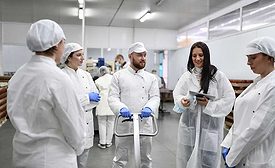Home » Keywords: » auditing
Items Tagged with 'auditing'
ARTICLES
Rings of Defense: Justifying and Negotiating Food Safety Actions to Regulators
In the stress of an inspection where a noncompliance is found, it is important to consider all avenues for corrective actions
October 9, 2023
Why a Paradigm Shift is Needed in Food Safety Auditing
The future of food safety auditing will be different from what we know today, but the pace of change must be faster
February 6, 2023
Never miss the latest news and trends driving the food safety industry
eNewsletter | Website | eMagazine
JOIN TODAY!Copyright ©2025. All Rights Reserved BNP Media.
Design, CMS, Hosting & Web Development :: ePublishing



